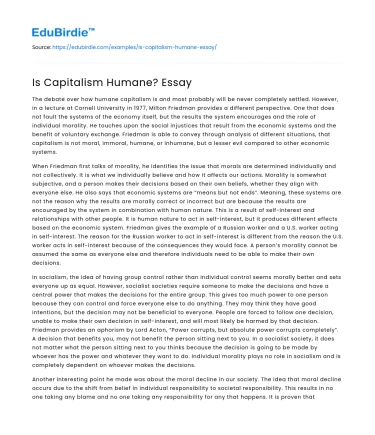The debate over how humane capitalism is and most probably will be never completely settled. However, in a lecture at Cornell University in 1977, Milton Friedman provides a different perspective. One that does not fault the systems of the economy itself, but the results the system encourages and the role of individual morality. He touches upon the social injustices that result from the economic systems and the benefit of voluntary exchange. Friedman is able to convey through analysis of different situations, that capitalism is not moral, immoral, humane, or inhumane, but a lesser evil compared to other economic systems.
When Friedman first talks of morality, he identifies the issue that morals are determined individually and not collectively. It is what we individually believe and how it affects our actions. Morality is somewhat subjective, and a person makes their decisions based on their own beliefs, whether they align with everyone else. He also says that economic systems are “means but not ends”. Meaning, these systems are not the reason why the results are morally correct or incorrect but are because the results are encouraged by the system in combination with human nature. This is a result of self-interest and relationships with other people. It is human nature to act in self-interest, but it produces different effects based on the economic system. Friedman gives the example of a Russian worker and a U.S. worker acting in self-interest. The reason for the Russian worker to act in self-interest is different from the reason the U.S. worker acts in self-interest because of the consequences they would face. A person’s morality cannot be assumed the same as everyone else and therefore individuals need to be able to make their own decisions.
Save your time!
We can take care of your essay
- Proper editing and formatting
- Free revision, title page, and bibliography
- Flexible prices and money-back guarantee
In socialism, the idea of having group control rather than individual control seems morally better and sets everyone up as equal. However, socialist societies require someone to make the decisions and have a central power that makes the decisions for the entire group. This gives too much power to one person because they can control and force everyone else to do anything. They may think they have good intentions, but the decision may not be beneficial to everyone. People are forced to follow one decision, unable to make their own decision in self-interest, and will most likely be harmed by that decision. Friedman provides an aphorism by Lord Acton, “Power corrupts, but absolute power corrupts completely”. A decision that benefits you, may not benefit the person sitting next to you. In a socialist society, it does not matter what the person sitting next to you thinks because the decision is going to be made by whoever has the power and whatever they want to do. Individual morality plays no role in socialism and is completely dependent on whoever makes the decisions.
Another interesting point he made was about the moral decline in our society. The idea that moral decline occurs due to the shift from belief in individual responsibility to societal responsibility. This results in no one taking any blame and no one taking any responsibility for any that happens. It is proven that people are shaped by society and what occurs in the world, but if that is used as reasoning to prove people innocent, it applies to everyone. A villain is shaped by society, and the victim is just a result of society's treatment of the villain. If we blame society for all our faults, we are blaming ourselves, as we are all a part of society, yet not taking any responsibility for anything that happens. This moral decline is influential in how much people will react to immorality and how they make decisions based on self-interest.






 Stuck on your essay?
Stuck on your essay?

